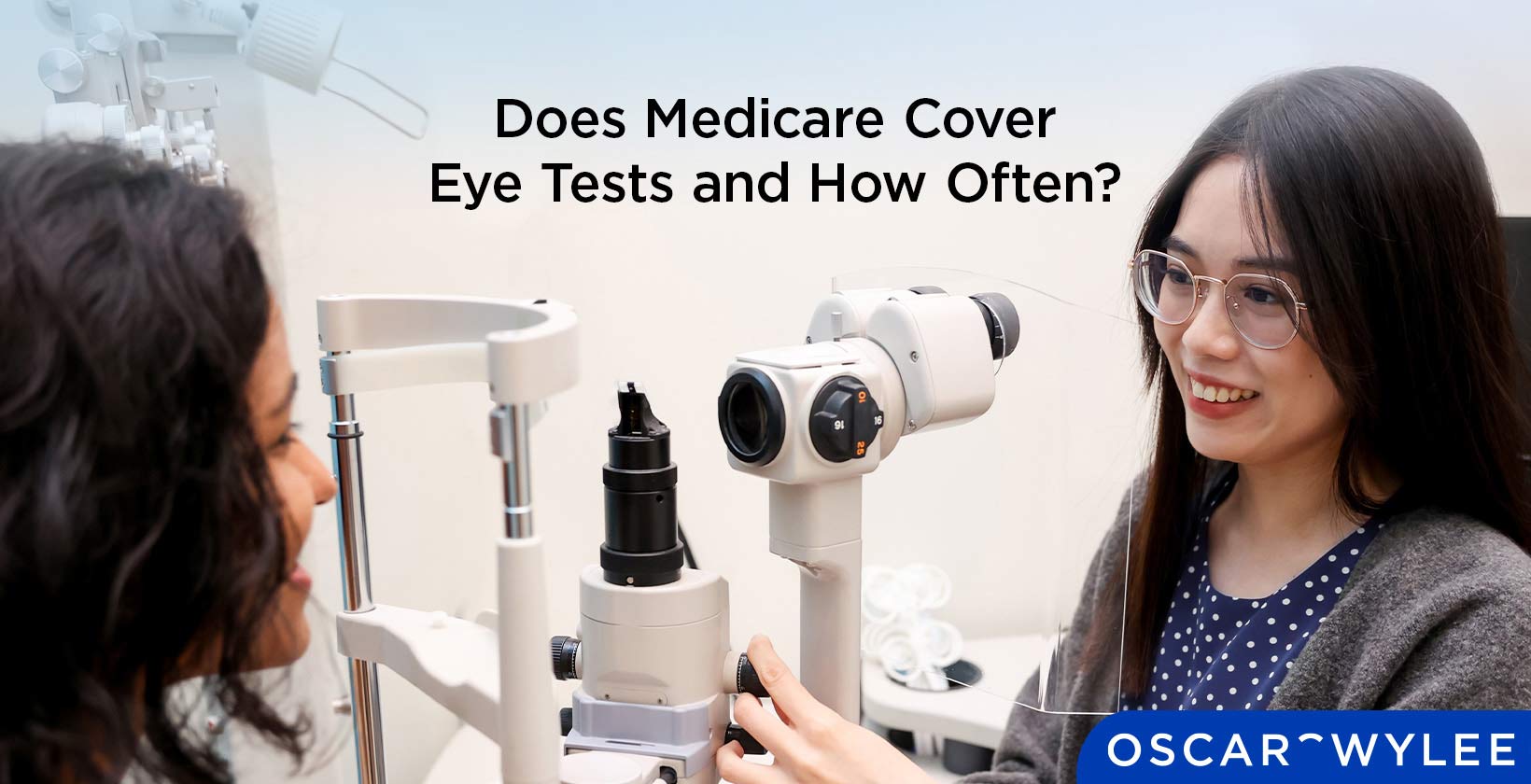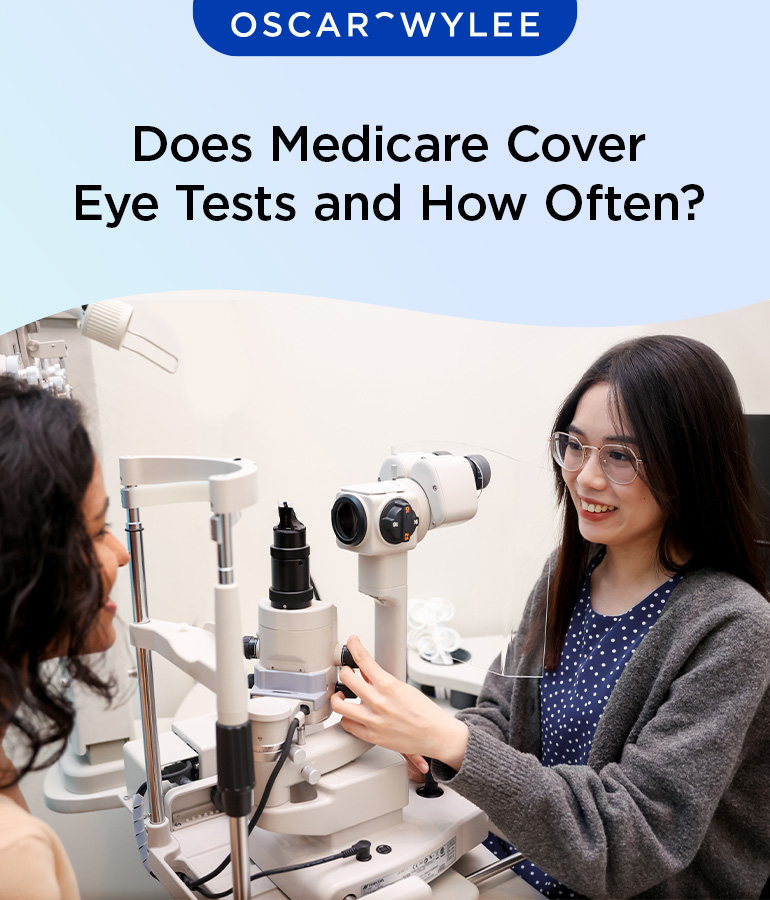Does Medicare Cover Eye Tests and How Often?
Published on September 5th, 2024
Medicare, Australia’s universal health care system, will generally cover eye tests conducted by qualified optometrists. Under Medicare, eye tests can be bulk billed, meaning an optometrist bills the Medicare system, not the customer. Medicare requires a person to be an eligible medicare cardholder to be bulk billed. For those under 65 years of age, Medicare will cover 1 eye test every 3 years. For those over 65, Medicare will cover 1 test every year. Bulk billed eye tests or eye exams are the most common eye care coverage under Medicare. Other eye care coverage can include ophthalmologist consultations, eye surgery and treatment for eye conditions. The exact eye care Medicare cover will be dependent upon the patient and care needed, so it is important to check with your eye care professional regarding Medicare bulk billing for eye care. At Oscar Wylee, our eye tests are Medicare bulk billed for eligible Medicare card holders. Keep reading to learn more about Medicare and eye care services.
Does Medicare Cover Eye Tests?
Yes, Medicare can cover eye tests carried out by an optometrist. An eye test is a procedure in which an optometrist or eye care professional will assess a person’s vision and examine the health of the eyes. Medicare is Australia’s universal healthcare system. Under Medicare, eye tests can be bulk billed, meaning an optometrist bills the Medicare system for the eye test, and not the customer. The customer must be an eligible cardholder to be bulk billed. However, not all optometrists will choose to bulk bill. It is important to check with your optometry provider on whether they bulk bill before booking. At Oscar Wylee, eye tests are bulk billed for eligible Medicare card holders.


How Often Does Medicare Pay for Eye Exams?
How often Medicare will cover eye exams depends on the patient's age. For those under 65, Medicare will cover 1 test every 3 years. For those 65 and over, Medicare will cover 1 test every year.
Does Medicare Cover Eye Surgery?
Medicare does not cover all eye surgeries. It is important to discuss payment with your doctor and eye care professional before getting eye surgery, as some procedures will not be covered or may only be partially covered by the Medicare system. Medicare does not cover elective surgeries, which include procedures such as laser eye surgery. Other surgeries may be eligible for some Medicare rebate, such as cataract surgery. It is important to check with your healthcare provider and Medicare on what surgeries are covered.
Can Children Have an Eye Exam Through Medicare?
Yes, children enrolled with Medicare can have a bulk billed eye test. According to Services Australia, when a person enrols their child in Medicare, the child has access to the same benefits as them. This means that an eye test for children can be bulk billed.
What Eye Care Coverage Does Medicare Provide?
Medicare may cover several aspects of eye care including eye examinations or eye tests, ophthalmologist consultations, eye surgery and treatment for eye conditions. However, whether Medicare will cover, and the amount they cover, can vary. It is always important to check with your eye care professional about what coverage Medicare can provide before proceeding. The possible Medicare eye care coverage is listed below.
- Eye examinations: Eye examinations, or eye tests, are generally covered by Medicare for eligible cardholders.
- Ophthalmologist consultations: Medicare may provide some cover for ophthalmologist consultations if a referral from a doctor or optometrist is made.
- Eye surgery: Eye surgery is not always covered by Medicare. Medicare does not cover elective surgeries, including cosmetic eye surgery, but may cover surgery such as cataract surgery.
- Treatment for eye conditions: Treatment for eye conditions may be covered to some degree by Medicare, depending on what treatment is needed.
1. Eye Examinations
Medicare will cover eye examinations or eye tests with qualified optometrists for eligible cardholders. Eye tests can be bulk billed under Medicare, meaning there are no out-of-pocket expenses for customers. Not all optometrists will bulk bill, so it is important to check with your optometrist about the cost before getting an eye test. Find an optometrist near you to get an eye test. At Oscar Wylee, all eye tests are Medicare bulk billed for eligible card holders.
2. Ophthalmologist Consultations
Medicare may provide some cover for ophthalmologist consultations. An ophthalmologist is a medical doctor who has a specialisation in eye care and is qualified to provide treatment for advanced eye conditions such as cataract surgery. According to the Australian Government’s Department of Health and Aged Care, patients referred to an ophthalmologist from an optometrist, may get Medicare benefits for ophthalmologist services at a referred rate. It is important to check with your optometrist and ophthalmologist on whether Medicare will cover the cost of your eye care.
3. Eye Surgery
Medicare may cover the cost of some eye surgeries, depending on what eye surgery it is and what type of hospital the surgery is taking place in. Medicare does not cover the cost of elective surgeries, including cosmetic eye surgery. Medicare may cover a certain amount of the cost on eye surgeries such as cataract surgery, but the exact amount may change depending on whether this surgery is conducted in a private or public hospital.
4. Treatment for Eye Conditions
Medicare may cover some costs regarding eye condition treatment such as treatment for macular disease. According to the Macular Disease Foundation, macular disease may be treated with eye injections and Retina photocoagulation or laser eye treatment. Medicare may provide some rebates for items related to these procedures.
Are Prescription Glasses and Contact Lenses Not Covered by Medicare?
The purchase of prescription glasses and contact lenses are not covered by Medicare. Depending on the optometrist you are purchasing lenses and glasses from, there may be payment plans or systems set up to help with the costs of frames. Private health funds may also help cover some of the cost of frames and lenses. At Oscar Wylee, we have Afterpay and Zip pay to help with frame payment. We also accept all major health funds in-store.


How Much is an Eye Test If I Have Medicare?
If a person is an eligible Medicare card holder and their optometrist bulk bills, there will be no out-of-pocket expenses for an eye test. This does not mean that eye tests at Oscar Wylee are free, instead, they are bulk-billed to the Medicare healthcare system. This means there will be no out-of-pocket payment for eligible Medicare cardholders, but the optometrist will bill the medicare system for the test. If a person is not enrolled with Medicare, they will generally have to pay for an eye test. Eye tests for those not covered by Medicare at Oscar Wylee cost $70.
Can I Use Medicare for Cosmetic Eye Procedures?
Medicare may not cover elective or cosmetic eye procedures, which may include surgeries such as blepharoplasty. A blepharoplasty is a surgery that aims to improve the appearance of the eyelids, according to the Better Health Channel.
Can I Claim for Macular Disease Treatment Using Medicare?
Medicare may be able to provide a certain amount of coverage for procedures carried out during macular disease treatment. Macular disease refers to eye conditions affecting the macula part of the eye, including age-related macular degeneration (AMD). According to the Macular Disease Foundation, Medicare provides some rebates for items related to eye injections and laser surgery, which can be used to treat macular disease. It is important to check with your health care or eye care professional in regards to treatment for macular disease and how much it will cost.
Does Medicare Cover Eye Refraction Tests?
Yes, Medicare covers eye refraction tests, as eye refraction tests are typically performed during a regular eye test. An eye refraction test refers to a test in which an optometrist or eye care professional will assess whether a person needs a prescription for glasses or contact lenses. A refraction test will allow an optometrist to determine how well a patient's eye is refracting light and whether they have any refractive errors like myopia or hyperopia. If a person has a refractive error, it will need to be corrected with a prescription.
Does Medicare Pay for Cataract Surgery?
Yes, Medicare can help pay a certain amount towards cataract surgery, depending on where the surgery takes place. According to the Australian Government’s Department of Health and Aged Care’s Medical Costs Finder, there is generally no cost for a patient getting cataract surgery in a public hospital with Medicare. If a person gets cataract surgery in a private hospital, they may have out-of-pocket costs.


Does Private Health Insurance Provide More than Medicare for Eye Care?
The difference in coverage between Medicare and private health insurance regarding eye tests is generally dependent on the private health fund. Most health funds do not cover eye tests but will usually cover some of the cost of frames and lenses. Whereas Medicare covers eye tests and some additional eye care services but does not cover the cost of frames.



